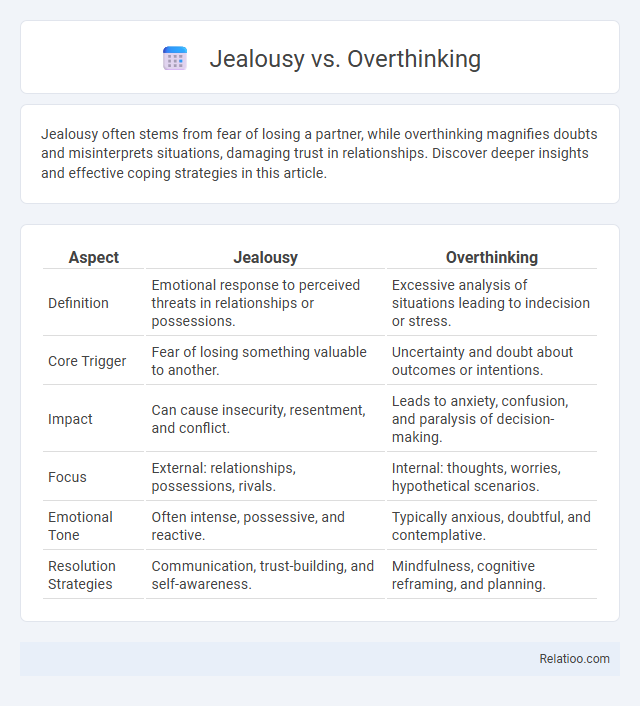Jealousy often stems from fear of losing a partner, while overthinking magnifies doubts and misinterprets situations, damaging trust in relationships. Discover deeper insights and effective coping strategies in this article.
Table of Comparison
| Aspect | Jealousy | Overthinking |
|---|---|---|
| Definition | Emotional response to perceived threats in relationships or possessions. | Excessive analysis of situations leading to indecision or stress. |
| Core Trigger | Fear of losing something valuable to another. | Uncertainty and doubt about outcomes or intentions. |
| Impact | Can cause insecurity, resentment, and conflict. | Leads to anxiety, confusion, and paralysis of decision-making. |
| Focus | External: relationships, possessions, rivals. | Internal: thoughts, worries, hypothetical scenarios. |
| Emotional Tone | Often intense, possessive, and reactive. | Typically anxious, doubtful, and contemplative. |
| Resolution Strategies | Communication, trust-building, and self-awareness. | Mindfulness, cognitive reframing, and planning. |
Understanding Jealousy: Causes and Triggers
Understanding jealousy involves recognizing its roots in fear of loss, insecurity, and low self-esteem, which can trigger intense emotional responses. You may experience jealousy when comparing yourself to others or fearing betrayal in relationships, often leading to overthinking scenarios that fuel anxiety. Identifying these triggers helps in managing jealousy by addressing underlying insecurities and shifting focus toward self-confidence and trust.
What is Overthinking? Key Signs and Symptoms
Overthinking involves excessive rumination on thoughts, leading to mental exhaustion and impaired decision-making. Key signs include constant worry, difficulty focusing, second-guessing choices, and persistent negative self-talk impacting your emotional well-being. Identifying these symptoms helps you manage overthinking patterns before they affect your mental health and relationships.
Jealousy vs Overthinking: Core Differences
Jealousy centers on fear of losing something valuable to you, often involving emotions tied to relationships or possessions, while overthinking is a cognitive process where your mind gets stuck in repetitive, excessive analysis of situations. Jealousy typically triggers emotional reactions and protective behaviors, whereas overthinking leads to mental exhaustion and indecision. Understanding the core differences can help you manage emotional responses and reduce mental clutter effectively.
How Jealousy Fuels Overthinking
Jealousy triggers a cascade of overthinking by intensifying insecurities and doubts, leading the mind to obsessively analyze situations and relationships. This heightened emotional state amplifies negative thought patterns, causing individuals to dwell on potential threats or betrayals without clear evidence. The interplay between jealousy and overthinking often results in distorted perceptions that reinforce anxiety and mistrust.
Emotional Impact: Jealousy and Overthinking in Relationships
Jealousy often triggers intense emotional responses like anxiety, insecurity, and mistrust, creating barriers to open communication in relationships. Overthinking amplifies these feelings by causing persistent rumination on perceived threats, which can heighten stress and emotional exhaustion for both partners. Together, jealousy and overthinking can erode relationship stability by undermining trust and fostering emotional distance.
Cognitive Patterns Behind Jealousy and Overthinking
Jealousy and overthinking both engage complex cognitive patterns involving heightened attention to perceived threats and self-doubt, often triggering repetitive negative thought cycles. Neuroimaging studies reveal increased activity in the amygdala and prefrontal cortex during episodes of jealousy, indicating emotional regulation challenges intertwined with cognitive control deficits. These patterns overlap with the rumination characteristic of overthinking, where persistent focus on uncertainties amplifies stress and impairs decision-making processes.
Signs You’re Struggling with Jealousy or Overthinking
Struggling with jealousy often manifests in persistent feelings of mistrust, insecurity, and obsessive comparison to others, while overthinking is characterized by repetitive, uncontrollable thoughts that cause mental exhaustion and indecision. Signs of jealousy include constant monitoring of a partner's actions, irrational suspicions, and emotional volatility, whereas overthinking presents as difficulty focusing, second-guessing decisions, and being trapped in negative thought cycles. Both conditions can impair relationships and mental well-being, requiring awareness of triggers and proactive coping strategies for effective management.
Healthy Coping Mechanisms for Jealousy and Overthinking
Jealousy and overthinking often trigger emotional distress, but healthy coping mechanisms can help manage these feelings effectively. You can practice mindfulness techniques and cognitive restructuring to reduce negative thought patterns and foster emotional balance. Building self-awareness and engaging in open communication further supports emotional resilience and promotes healthier responses to jealousy and overthinking.
How to Communicate About Jealousy and Overthinking
Communicating about jealousy and overthinking requires clarity and honesty to prevent misunderstandings and build trust. Express your feelings calmly by describing specific behaviors that trigger your jealousy or overthinking instead of making assumptions about intentions. Encourage open dialogue where both you and the other person can share perspectives, fostering empathy and finding solutions together.
Strategies for Long-Term Emotional Balance
Jealousy often triggers overthinking, creating a cycle that disrupts emotional stability and strains relationships. Effective strategies for long-term emotional balance include cognitive-behavioral techniques to challenge irrational thoughts, mindfulness practices to stay present, and open communication to address underlying insecurities. By developing these skills, you can reduce emotional turbulence and foster healthier mental well-being.

Infographic: Jealousy vs Overthinking
 relatioo.com
relatioo.com